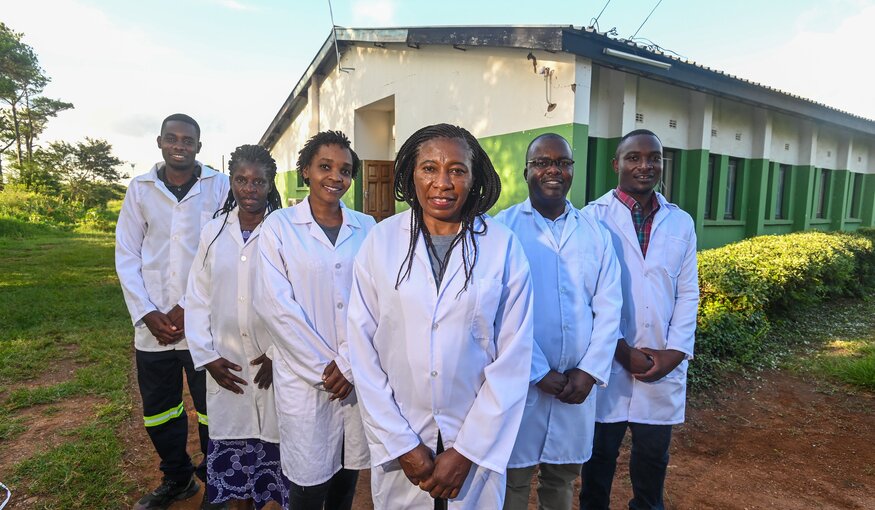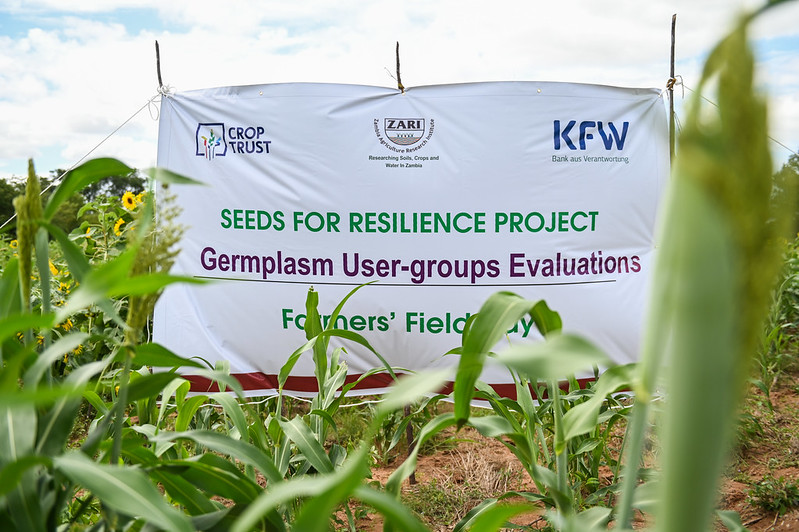African Genebanks Build a Community

Part of genebank team outside the National Plant Genetic Resources Centre (NPGRC) of the Zambia Agriculture Research Institute (ZARI). Located at ZARI’s Mt Makulu Central Research Station, Lusaka. Photo: Neil Palmer for the Crop Trust.
12 July 2023
Conserving crop diversity is not just about adventurous activities like trekking through the jungle on elephant-back to track down the “lost” wild relatives of beans or potatoes.
The day-to-day routine of running a genebank is just as important, if not quite as romantic: cleaning and treating newly acquired seeds, drying and packing them for storage or distribution, labelling them, and keeping a record of each batch.
Each genebank tends to have its own approach, often developed in isolation. This is because there may be only one genebank in a country, and the pool of specialists is small. Everyone tries to do their best, to the best of their knowledge, more or less on their own.
The Seeds for Resilience Project (S4R), funded by the German Federal Ministry for Economic Cooperation and Development (BMZ) through the German Development Bank (KfW), is trying to change that. It is working with five national genebanks in Africa—Ethiopia, Ghana, Kenya, Nigeria and Zambia—to help them achieve and maintain world-class operations. A key step in this journey is knowledge sharing and capacity building among the genebank.
For almost 20 years, the Crop Trust has worked with the international genebanks of CGIAR, whose staff are eager to share their experiences and knowledge with their counterparts from other genebanks. We are now trying to extend that to national genebanks.
“This is a key part of the Seeds for Resilience approach,” says Nora Castañeda, manager of the Project. “We are building a community of genebank professionals that will last long after the project ends. We hope the exchange of knowledge and ideas will continue and contribute to the generation of new approaches that are adapted to the needs of genebanks in Africa and elsewhere in the world.”
Nigeria and Kenya
In 2022, the Project finally managed to shrug off the strictures of the COVID-19 pandemic and hold its first regional face-to-face workshops.
The first one was held at the International Institute of Tropical Agriculture (IITA) in Ibadan, Nigeria, in April. This brought together a total of 10 participants from all the genebanks supported by the project, 12 presenters from IITA, as well as Crop Trust staff and consultants. The Kenya workshop, which took place in Nairobi in May, involved an even larger group of 41 participants and presenters.
Both workshops gave participants an opportunity to see different ways of managing genebank collections and making them available to users, especially plant breeders and farmers.
The topics included quality management, communications, data management as well as building and strengthening relationships with farmers.
Falalou Hamidou, manager of the regional genebanks of the International Crops Research Institute for the Semi-Arid Tropics (ICRISAT) in Niger and Zimbabwe, talked about how quality management has contributed to the growth of the ICRISAT genebank collection and to the rapid increase in the number of seed samples it distributes each year. These went from fewer than 2,000 in 2012 to nearly 20,000 in 2021.
Eva and Fred Weltzien-Rattunde, consultants for the Crop Trust, facilitated a session on how to work with farmers to select crop varieties that meet their needs.
During both workshops, the participants toured national and international genebanks. At IITA’s Genetic Resources Center, they visited laboratories and field collections, including cassava and yam. The visit to the World Agroforestry Centre (ICRAF) genebank in Nairobi included a session on seed viability testing, which complemented a virtual presentation by Fiona Hay of Aarhus University in Denmark.
“The workshops were intense, with so many topics on the schedule,” says Rashied Tetteh, head of the seed genebank of the CSIR-Plant Genetic Resources Research Institute, Ghana. “But they were a great opportunity to see the latest genebank management standards in operation.”

Seeds For Resilience signage at evaluation nurseries at Lusitu Bridge Camp, Chirundu, southern Zambia. Photo: Neil Palmer for the Crop Trust.
Next Steps
Following on from the workshops, the Project is arranging for IITA and ICRISAT genebank staff to visit the Seeds for Resilience national genebanks to continue training on the regeneration of open pollinated crops, seed viability protocols and the design of germination rooms, according to Castañeda.
S4R is also procuring the necessary equipment for the genebanks to upgrade their information systems, she says.
"And soon, our Crop Trust Information Systems team will visit each genebank to help them adopt GRIN-Global Community Edition, which will facilitate the management of their collections,” Castañeda says.
GRIN-Global Community Edition is an updated version of an open-source, freely downloadable genebank data-management system developed by the U.S. Department of Agriculture and the Crop Trust.
The Project has many more workshops and capacity-building events planned, including one later this year on quality management systems and seed longevity, hosted by Aarhus University.
"The global genebank community is small in numbers but big in passion and commitment,” Castañeda says. “It is wonderful—and vital to the success of the genebanks—for all of us to be able to get together and share how we solve the problems we face every day in keeping seeds alive and available for future generations.”
Category: Seeds for Resilience
